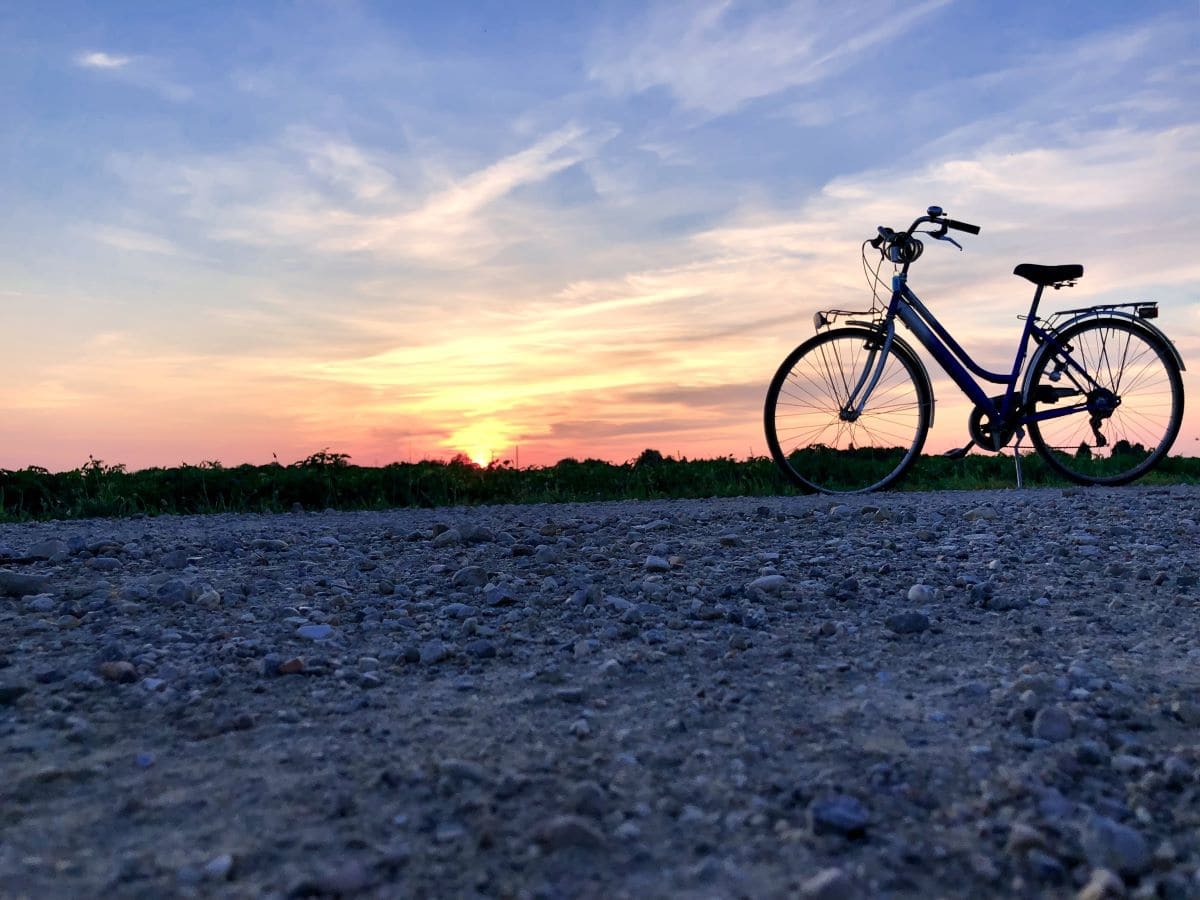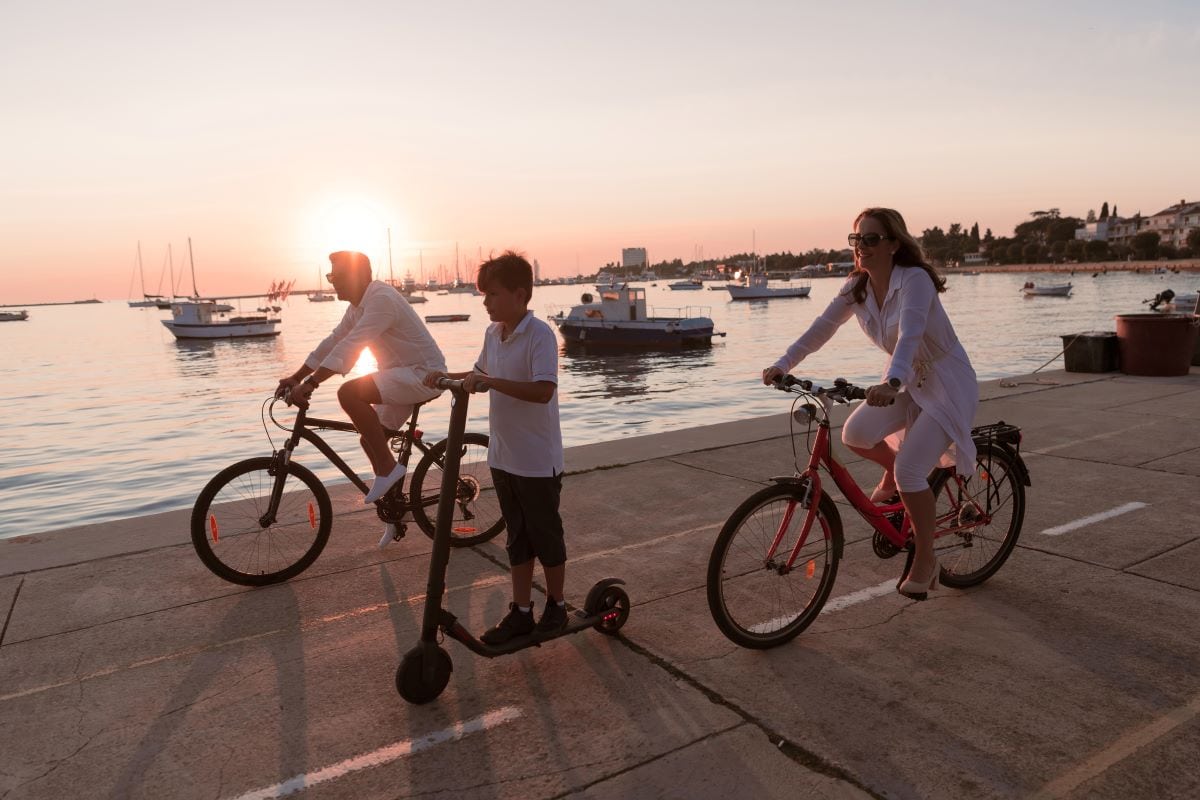20 Benefits of Driving Less That Might Surprise You!
This post may contain affiliate links for your convenience. That means that if you make a purchase, I will receive a small commission at no extra cost to you. Read more here.
For most people, a car is listed under the “must-have” category. While it’s true that cars can often be a simple way to get around, there are plenty of benefits to driving less in your daily routine.
I can personally testify to the benefits of not only just driving less, but also giving up car ownership altogether! Our minimalist family of 4 has been enjoying the car-free life in Europe for the past 6 months, so I’ve had plenty of time to think about this topic.
While the no-car lifestyle isn’t for everyone, there are still plenty of reasons to drive less. Even if you take a few days off from your car or opt to drive less frequently, here are twenty ways that driving less can be beneficial.

benefits of driving less
1. Driving Less Reduces Stress
Perhaps the most immediate benefit I’ve noticed has been a reduction in stress.
Driving can create a stressful atmosphere, particularly in high-density areas. You wouldn’t believe the mind-numbing traffic, poor driving, and road rage that I’ve experienced living around the world.
Such as:
- one man beating another man’s car door with a HUGE metal wrench on a busy road in Chicago
- our Shanghai taxi driver who missed a highway turnoff and stopped IN THE MIDDLE of the highway to backup
- motorbikes weaving in and out of traffic dangerously in Berlin
Living in a big city means seeing stuff like this on a daily basis, resulting in stress, anxiety, and overwhelm. You can reduce these negative emotions by driving less frequently and opting for lower-stress transportation.
For example, walking can be a great stress reliever at any time of the day. Adding a walk to your daily routine can keep you grounded, mindful, and clear from that cringe-worthy road rage.
If walking isn’t an option, taking another form of transportation like a train, Uber, or bus allows others to take on the burden of driving while you can happily enjoy a book or listen to some calming music.
Find out more ideas on how to apply the “less is more” principle in your daily life and check out this post.
2. Save Time by Skipping the Commute Grind
We could all use a little more time in the day. This makes saving time a major incentive to drive less.
By finding alternative modes of transportation, you can reduce traffic pollution and benefit everyone. The fewer vehicles on the road, the quicker and more efficient your journey will be.
Try this time-saving technique by taking advantage of the public transportation in your area or reducing the number of trips you make throughout your day.
Even if you find that taking a form of transportation like a bus takes more time in terms of minutes, think of all the multitasking you can do during that time! Rather than focus on the roads you can catch up with a friend, work on a hobby, or lose yourself in a good book.
3. Lower Your Carbon Footprint
Environmental welfare is a growing concern in many people’s lives, so why not jump at the chance to reduce your carbon footprint?
Driving less is a simplistic way to achieve this goal. Driving accounts for 29% of greenhouse gas emissions in America, making it the leading cause of greenhouse gas emissions.
If Americans chose to drive just 10% less, there would be a significant effect on greenhouse gas emissions (roughly 110 million metric tons of carbon dioxide every year).
The benefit of aiding the climate crisis is a meaningful incentive to drive less.
4. Driving Less Reduces Your Chance of Car Accidents
When it comes to statistics, driving daily seems downright spooky.
Car accidents are amongst the leading causes of accidental deaths in America., with an estimated 3,700 people losing their lives every day to fatal car accidents.
Your daily commute is likely the most dangerous part of your day-to-day life.
By reducing the number of cars on the road, you are reducing the amount of potentially fatal car accidents. Driving less helps keep everyone safer. This benefit goes beyond the surface level; it could save lives!
5. Gives You More Time Outdoors
In today’s busy world, it can be hard to find and allocate the time to spend in nature. By driving less, you can build that time into your day-to-day activities.
Choose to walk to the store or bike around to do your errands. You’ll get an extra dose of fresh air that does everyone good!
Even choosing public transportation gets you out and walking short distances. Sometimes that little boost of nature is all that you need.

6. Driving Less Forces You to be More Present
Driving can be an isolating experience. It gets you from point A to point B without very much thinking at all. Taking driving out of our daily routine forces you out of this autopilot.
So, driving less allows you to be more present in your everyday life. When you are not task-focused on driving, you would be surprised by what comes to fruition. You get to focus more on your surroundings and use this extra mental space to be more present.
Use this as an opportunity to take in the scenery and discover places you had simply zipped by in the past on your journey to your destination.
By choosing a walk or a bike ride over driving, you force yourself to experience life in a less sheltered way. This may be pushing some people out of their comfort zones, but I promise that the benefits are worth the risk!
If you’re looking for more ideas to be intentional and mindful in your daily habits, make sure to check out this post here.
7. Gives You a New Hobby
Driving less doesn’t mean eliminating something from your life; it could mean adding a fun new hobby to your routine. Biking is an excellent way to add exercise to your daily commute or serve as an enjoyable past-time.
Use this newfound hobby to explore the city and nature alike.
8. Driving Less Avoids Soaring Gas Prices
Monetary incentives are a big reason you may want to drive less.
With inflation and gas prices climbing to record highs seemingly every month, driving has become an unaffordable luxury for many people in comparison to public transportation.
Save on fuel, and your paycheck, by reducing the amount you drive.
READ MORE: 10 Simple Minimalist Budget Tips to Save More Money NOW!
9. Be More Social
Driving less can make you a more social person. Carpooling is a great option to save on mileage and increase your social time. This is likely a choice that will most benefit extroverts, but even introverts can enjoy carpooling with the right person.
Use your work commute to catch up with friends and co-workers. Turning your commute into a social space frees up more time on your weekends for you to widen your horizons. The camaraderie you build here can transfer to the workplace and boost spirits throughout the workweek.
Carpooling can also be a great new opportunity to meet new people! Are you new to the city? Have you been working with the same people for a while now but can’t seem to cross that coworker-to-friendship barrier?
Carpooling could be the answer. Plus, you get the added advantage of taking the carpool lane to save on time (score!).
Carpooling is also fun and efficient outside of the workplace. Turn boring errands into a hangout by doing them with your friends. Social productivity is a win-win.
10. Get More Exercise
Exercise can be tricky to fit into your life. The benefits of exercise to your heart health and overall fitness make it an integral component of your day.
Choosing more active modes of transportation such as biking, walking, or scooting can all increase your activity levels and help contribute to a naturally fitter lifestyle.

11. Save on Insurance
Another monetary benefit of driving less is reducing the amount you need to spend to insure your car. The less you drive your car, the cheaper your insurance premium is.
You can also choose to pay to insure your car based on the mileage you use. This works circularly; it saves you money and gives you an incentive to drive less.
You can choose to skip this monthly payment altogether if you decide to ditch the car. The savings really add up!
12. Driving Less Save on Car Repairs
Car repairs can be a pricey endeavor. You can quickly lose an entire paycheck (or worse!) if you need emergency repairs. This does not even account for the regular upkeep cars require.
Save on these repairs by reducing your time driving and limiting the wear you put on your car.
RELATED POST: 10 Tips for Living on One Income and Never Feeling Poor & Broke
13. Be More Mindful about How you Use Your Time
Driving our vehicles can seem like the ultimate convenience when running errands.
This convenience, however, can allow us to make decisions on a whim and not take full advantage of where we’re going and what else we could get done in the area.
Using alternative means of transportation forces us to be more mindful of how we use our time. You can group things based on location and cut out unnecessary car trips. Gone is the urge to run to the grocery store for a single onion, then promptly return home to realize you’re also out of toothpaste.
Public transport, or other active transportation, forces you to have a plan and keep you more organized in general.
14. Avoid Parking Horrors
Parking can be a giant pain in the butt for several reasons. If you live in the city, you know the horrors of trying to find the right parking spot.
It could be a 5-minute drop-off zone, residential parking only, or even some obnoxious 4×4 somehow taking up three spots.
And do not get me started on the ever-dreaded parallel parking.
Finding alternative means of transportation cuts out the parking hassle and gets you to where you need to be, faster. You also avoid the outrageous parking fees.
Permanent parking is a whole other story. It can be a real struggle to find everyday storage for your vehicle. If you can’t, your car has to be parked outside and is subject to environmental wear and tear and the whims of random passers-by.
Apartments tend to charge an arm and a leg for parking spots. By not having a car, you can pocket this expense.
15. Eliminate Car Clutter
Cars are a means of transportation, not storage, but many of us are tempted to treat them as a catch-all for things we don’t want or can’t fit into our homes. Vehicles also tend to be a breeding ground for the garbage we forget about.
An unmatched mitten in the console here, a takeaway cup thrown in the backseat there; these things can quickly add up and become unmanageable. A cluttered car manifests a cluttered mind.
Going care-free completely cuts the clutter 100%, but if you don’t want to go that far at least take the time to tidy up your car so it’s less stressful when you do have to drive!
You can read more decluttering tips here.
16. Driving Less Extends Your Vehicles Life
By driving less, you can extend your vehicle’s life.
Less frequent driving means there is less regular wear and tear on your vehicle. This will help you make the best out of your purchase and hold on to your car for as long as you need it.
You will also help maintain your vehicle’s monetary value in case you plan on selling it down the road.
17. Turn Your Commute into Free Time
By driving less, you’re able to take advantage of this time to do something productive or just downright enjoyable. Avoid distracted driving by opting for public transit and treating it as free time.
You can use this time to your benefit by listening to podcasts, reading a book, or simply catching up on emails.
You can also use your transit commute as a way to wind down after a busy day. Simply pop in your headphones and relax. This is a simple way to clear your mind of work and unwind.

18. Driving Less Avoids Traffic Violations
Gone is the possibility of tickets if you choose a car-free path.
Even limiting your car use lessens the chances of receiving a traffic violation ticket (or worse, a tow!). This will save you time, money, and potential headaches down the road.
19. Reduce Road-Maintenance Needs
One less considered effect is the damage that vehicles cause on roads. By driving less, you can help contribute to lower needs for road maintenance.
The fewer cars on the road, the less wear, and tear they endure. This benefits both you and your community in the long run. Money saved on repairing roads and infrastructure can be allocated towards other prominent needs and support the beauty of the community.
20. Enjoy an Alcoholic Beverage Responsibly (and Worry-Free!)
For those of you who enjoy an alcoholic beverage on occasion, you can do so with even more ease without the hindrance of a car. By-pass the hassle of finding overnight parking and rushing back before the sun rises to retrieve your vehicle.
Instead, enjoy your night and take advantage of alternative transportation.
With several accessible and affordable rideshare apps available, you can ensure a safe ride home without the hassle. Call a cab or enjoy a safe walk home with friends. You can even take advantage of specific community-driven services that help get everyone home safe after a drink or two.
Some Final Thoughts on Driving Less
Though driving is a convenience that has become the societal norm, reducing the amount you drive has benefits that can outweigh this convenience. Driving less has benefits that can inspire personal growth and better communities on a global scale.
Are you interested in driving less? Let me know what you think in the comments below. Let me know if you are Team Car, Team No Car, or somewhere in between!

Practice being more aware of the other traffic around you. Sometimes we become very focused just on what’s around us, but it can be very fulfilling (and much safer) to develop an all-around awareness, using our mirrors as well as what we can see in front of us. As drivers pass you, wish them well. Repeat, “May you be well, May you be happy” even as cars cut you off.
That sounds like a good practice, Emma! Interestingly, I used to work with deaf and hard-of-hearing clients and they are well-known for being excellent drivers. They are very aware of what’s going on visually around them at all times! Just a neat little tidbit. Take care!